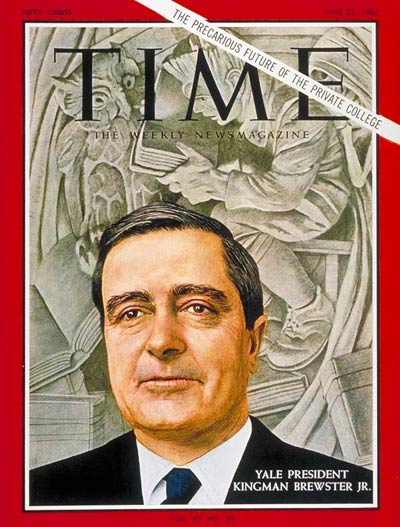
Milestone moments do not a year make. Often, it’s the smaller news stories that add up, gradually, to big history. With that in mind, in 2017 TIME History will revisit the entire year of 1967, week by week, as it was reported in the pages of TIME. Catch up on last week’s installment here.
As commencement season wound down, TIME took a look at what was going on at America’s colleges and universities — and found that those in charge weren’t exactly feeling the celebratory mood of graduation time. In fact, at private universities ranging from the most elite to the most niche, a financial crisis was looming, as costs quickly surpassed revenue.
What had changed? The magazine identified several factors in play. For one thing, public universities were getting more support from legislators, which translated to more money in their budgets, which meant more competition for faculty, students and other resources, which meant that professors and support staff could demand higher pay. Secondly, fields of study, especially in the sciences but in the humanities as well, were getting more specialized, which made them more expensive to teach. “Before World War II, a single professor could teach everything that Columbia expected a student to know about China; now he would pick up fragments of Sinology from 20 specialized scholars,” the story explained. Thirdly, reliance on endowments meant that funds were locked into places where they weren’t necessarily most useful — as one administrator explained, nobody earmarks money in their will for janitors. And finally, though fundraising drives were proving successful, that money tended to pay for expansion of one kind or another, which in fact raised operating costs even more.
But there was hope for the future — and TIME placed it in the person of Kingman Brewster, president of Yale, who was injecting some pep into the school and shaking it out of “complacency over its declining fiscal fortunes.”
In addition to stirring the campus culture with plans such as a possible commingling of Yale and Vassar (neither of which had gone coed yet), he advocated for both greater use of the college’s endowment and a plan by which colleges would charge students a tuition that represented the full cost of their education — which was at the time $5,520 per Yalie, compared to the $3,300 tuition and fees actually charged — with the expectation that they would borrow that money from the government, to be repaid with a tax.
Though many other educators took issue with Brewster’s idea, most agreed that the ultimate fix would have to come in some form of money from the federal government, and that its effect would be to blur the line between private and public universities, as money and students would “gain mobility to go where the teaching is best.” Sure enough, the funding source that would come to be known as the Pell Grant would be introduced just five years later.
Marshall Appointed: As the national news section noted, President Lyndon Johnson had made history during the week in question by appointing Thurgood Marshall — whose great-grandfather had been an enslaved man — to be the first African-American Justice to sit on the Supreme Court. Interestingly, the piece explained, “thanks in large part to his own efforts” as a lawyer for the NAACP, his arrival on the bench seemed unlikely to coincide with a major period of civil-rights decision-making, as the court had already affirmed many of the rights for which Marshall had fought.
How to Stop a Riot: This TIME cover story from October about Syria and its white-helmet-wearing humanitarians gave a new layer of meaning to a write-up of how some American cities had successfully used white helmets to help calm possible race riots. The key steps deployed in the cities in question were “levelheaded” law enforcement, “open communication” between police and the communities in question, and the deployment of young black men and women in white hard hats to move around the most volatile neighborhoods urging peace, hearing grievances and encouraging other methods of making voices heard.
Swinging Gone Wrong: The actual amount of national news in this crime story about a murder case in California is pretty low but the twists and the writing are amazing. In a case of what looked like a swinging couple and a jealous husband, the protagonists were “a woman woman-watchers watched” and a “45-year-old social lion” who were “nothing if not adult about adultery.”
Loving Decided: Though the case has since inspired films and its own holiday, the Supreme Court decision in Loving v. Virginia, which ruled that antimiscegenation laws were unconstitutional, got only this quick write-up of a few paragraphs.
Understatement of the Century: The magazine’s postmortem on the Six-Day War concluded that the fundamental question of the conflict — “about the borders of Israel and about how much (if any) of its conquered territory it has a right to keep” as well as “its basic right to exist” — would likely be debated “for months and perhaps years.”
Great vintage ad: So clever — a crossword puzzle!
Coming up next week: Soviet Talks
More Must-Reads from TIME
- Donald Trump Is TIME's 2024 Person of the Year
- Why We Chose Trump as Person of the Year
- Is Intermittent Fasting Good or Bad for You?
- The 100 Must-Read Books of 2024
- The 20 Best Christmas TV Episodes
- Column: If Optimism Feels Ridiculous Now, Try Hope
- The Future of Climate Action Is Trade Policy
- Merle Bombardieri Is Helping People Make the Baby Decision
Write to Lily Rothman at lily.rothman@time.com